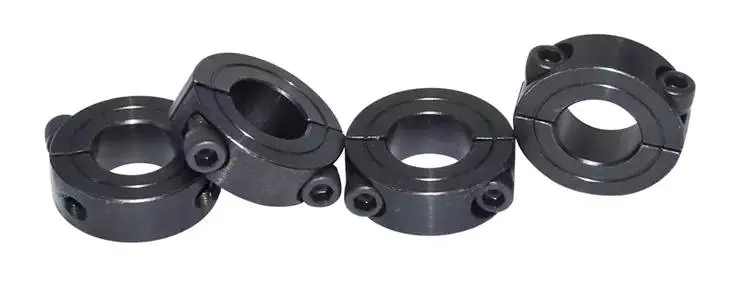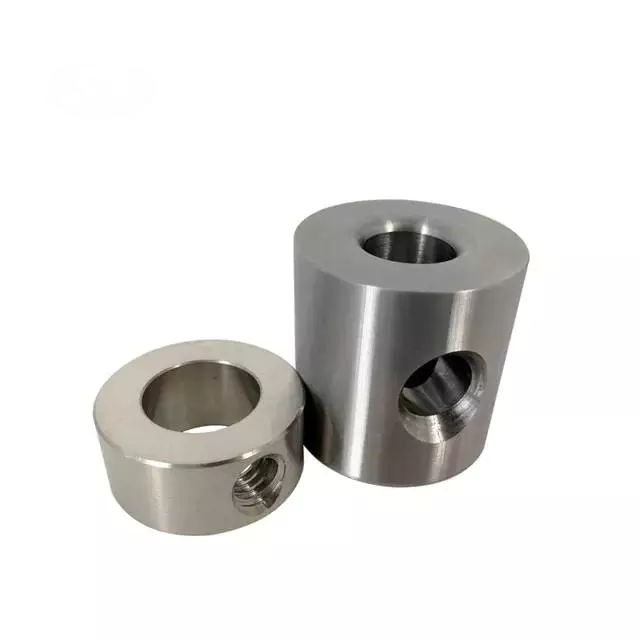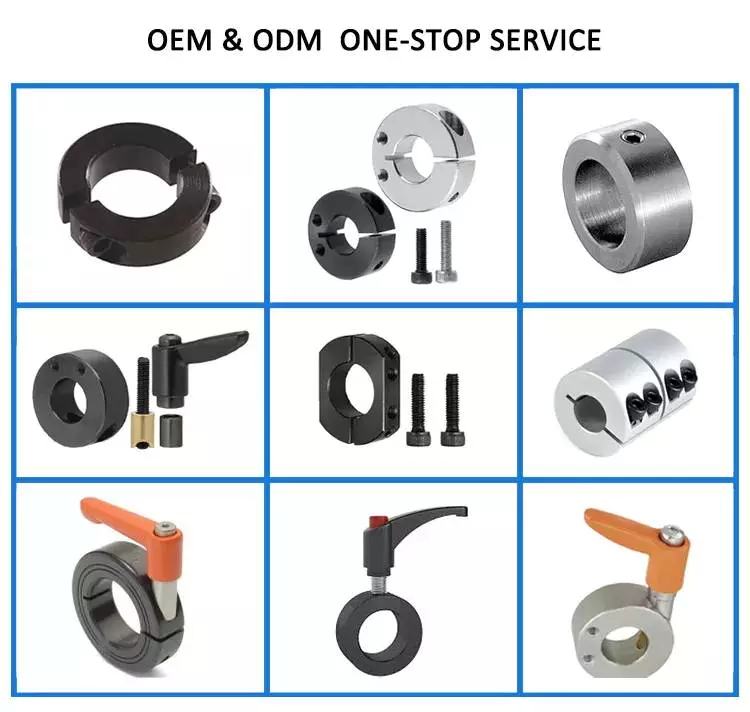Product Description
| Basic Info. of Our Customized CNC Machining Parts | |
| Quotation | According To Your Drawings or Samples. (Size, Material, Thickness, Processing Content And Required Technology, etc.) |
| Tolerance | +/-0.005 – 0.01mm (Customizable) |
| Surface Roughness | Ra0.2 – Ra3.2 (Customizable) |
| Materials Available | Aluminum, Copper, Brass, Stainless Steel, Titanium, Iron, Plastic, Acrylic, PE, PVC, ABS, POM, PTFE etc. |
| Surface Treatment | Polishing, Surface Chamfering, Hardening and Tempering, Nickel plating, Chrome plating, zinc plating, Laser engraving, Sandblasting, Passivating, Clear Anodized, Color Anodized, Sandblast Anodized, Chemical Film, Brushing, etc. |
| Processing | Hot/Cold forging, Heat treatment, CNC Turning, Milling, Drilling and Tapping, Surface Treatment, Laser Cutting, Stamping, Die Casting, Injection Molding, etc. |
| Testing Equipment | Coordinate Measuring Machine (CMM) / Vernier Caliper/ / Automatic Height Gauge /Hardness Tester /Surface Roughness Teste/Run-out Instrument/Optical Projector, Micrometer/ Salt spray testing machine |
| Drawing Formats | PRO/E, Auto CAD, CZPT Works , UG, CAD / CAM / CAE, PDF |
| Our Advantages | 1.) 24 hours online service & quickly quote and delivery. 2.) 100% quality inspection (with Quality Inspection Report) before delivery. All our products are manufactured under ISO 9001:2015. 3.) A strong, professional and reliable technical team with 16+ years of manufacturing experience. 4.) We have stable supply chain partners, including raw material suppliers, bearing suppliers, forging plants, surface treatment plants, etc. 5.) We can provide customized assembly services for those customers who have assembly needs. |
| Available Material | |
| Stainless Steel | SS201,SS301, SS303, SS304, SS316, SS416, etc. |
| Steel | mild steel, Carbon steel, 4140, 4340, Q235, Q345B, 20#, 45#, etc. |
| Brass | HPb63, HPb62, HPb61, HPb59, H59, H62, H68, H80, etc. |
| Copper | C11000, C12000,C12000, C36000 etc. |
| Aluminum | A380, AL2571, AL6061, Al6063, AL6082, AL7075, AL5052, etc. |
| Iron | A36, 45#, 1213, 12L14, 1215 etc. |
| Plastic | ABS, PC, PE, POM, Delrin, Nylon, PP, PEI, Peek etc. |
| Others | Various types of Titanium alloy, Rubber, Bronze, etc. |
| Available Surface Treatment | |
| Stainless Steel | Polishing, Passivating, Sandblasting, Laser engraving, etc. |
| Steel | Zinc plating, Oxide black, Nickel plating, Chrome plating, Carburized, Powder Coated, etc. |
| Aluminum parts | Clear Anodized, Color Anodized, Sandblast Anodized, Chemical Film, Brushing, Polishing, etc. |
| Plastic | Plating gold(ABS), Painting, Brushing(Acylic), Laser engraving, etc. |
FAQ:
Q1: Are you a trading company or a factory?
A1: We are a factory
Q2: How long is your delivery time?
A2: Samples are generally 3-7 days; bulk orders are 10-25 days, depending on the quantity and parts requirements.
Q3: Do you provide samples? Is it free or extra?
A3: Yes, we can provide samples, and we will charge you based on sample processing. The sample fee can be refunded after placing an order in batches.
Q4: Do you provide design drawings service?
A4: We mainly customize according to the drawings or samples provided by customers. For customers who don’t know much about drawing, we also provide design and drawing services. You need to provide samples or sketches.
Q5: What about drawing confidentiality?
A5: The processed samples and drawings are strictly confidential and will not be disclosed to anyone else.
Q6: How do you guarantee the quality of your products?
A6: We have set up multiple inspection procedures and can provide quality inspection report before delivery. And we can also provide samples for you to test before mass production.
/* March 10, 2571 17:59:20 */!function(){function s(e,r){var a,o={};try{e&&e.split(“,”).forEach(function(e,t){e&&(a=e.match(/(.*?):(.*)$/))&&1
| Condition: | New |
|---|---|
| Certification: | CE, RoHS, GS, ISO9001 |
| Standard: | DIN, ASTM, GOST, GB, JIS, ANSI, BS |
| Customized: | Customized |
| Material: | Alloy |
| Application: | Metal Recycling Machine, Metal Cutting Machine, Metal Straightening Machinery, Metal Spinning Machinery, Metal Processing Machinery Parts, Metal forging Machinery, Metal Engraving Machinery, Metal Drawing Machinery, Metal Coating Machinery, Metal Casting Machinery |
| Samples: |
US$ 3/Piece
1 Piece(Min.Order) | |
|---|
| Customization: |
Available
| Customized Request |
|---|

What are the temperature and corrosion resistance properties of shaft collars?
The temperature and corrosion resistance properties of shaft collars vary depending on the materials they are made of. Different materials exhibit different levels of resistance to temperature extremes and corrosion. Here are some commonly used materials for shaft collars and their temperature and corrosion resistance properties:
- Steel: Steel shaft collars, particularly those made from stainless steel, offer excellent temperature and corrosion resistance properties. Stainless steel is known for its high strength, durability, and resistance to rust and corrosion. It can withstand a wide range of temperatures, from low cryogenic temperatures to high heat environments. Stainless steel shaft collars are often used in applications where exposure to moisture, chemicals, or harsh environments is a concern.
- Aluminum: Aluminum shaft collars have good temperature resistance properties and can handle moderate temperature ranges. They are lightweight and offer reasonable corrosion resistance. However, aluminum is not as corrosion-resistant as stainless steel and may be susceptible to certain chemicals or highly corrosive environments. Aluminum shaft collars are commonly used in applications where weight reduction is a priority, such as aerospace or automotive industries.
- Plastic: Plastic shaft collars, such as those made from nylon or acetal, have limited temperature resistance compared to steel or aluminum. They can typically handle moderate temperatures but may deform or degrade at higher temperatures. Plastic collars are not as resistant to corrosion as metal collars but can still offer good resistance to certain chemicals and environmental conditions. Plastic collars are often used in applications where weight, cost, or electrical insulation properties are important factors.
- Brass: Brass shaft collars offer good temperature resistance and moderate corrosion resistance. They can handle a range of temperatures and are often used in applications where a combination of durability, conductivity, and aesthetics is required. Brass collars may tarnish over time but can still maintain their functionality and structural integrity.
It is important to note that the temperature and corrosion resistance properties of shaft collars can also be influenced by factors such as the specific alloy composition, surface treatments, and environmental conditions they are exposed to. When selecting shaft collars for your application, it is crucial to consider the temperature range and potential exposure to corrosive substances or environments. Consulting with manufacturers, reviewing technical specifications, and considering industry standards or guidelines can help ensure that you choose shaft collars with appropriate temperature and corrosion resistance properties for your specific needs.

Can I find guidelines on lubricating and maintaining shaft collars for optimal performance?
Yes, guidelines on lubricating and maintaining shaft collars for optimal performance can be found. Proper lubrication and maintenance are essential for ensuring the smooth operation and longevity of shaft collars. Here are some common sources where you can find guidelines on lubricating and maintaining shaft collars:
- Manufacturer Websites: Many shaft collar manufacturers provide guidelines or recommendations for lubrication and maintenance on their websites. These guidelines may include information on the type of lubricant to use, the frequency of lubrication, and specific maintenance procedures. Visiting the websites of specific collar manufacturers and exploring their resources section or product documentation can help you find the lubrication and maintenance guidelines you need.
- Product Manuals or Documentation: When purchasing shaft collars, they often come with product manuals or documentation that include instructions for lubrication and maintenance. These manuals may provide step-by-step procedures, recommended lubricants, and maintenance schedules. Referencing the manuals or documentation that accompany your specific collar model can provide valuable guidance on how to properly lubricate and maintain your shaft collars.
- Industrial Machinery Handbooks: Handbooks or reference books related to industrial machinery or mechanical components often include sections on lubrication and maintenance practices. These resources can provide general guidelines and best practices for maintaining various types of mechanical components, including shaft collars. Checking reputable handbooks or reference books in the field of mechanical engineering can offer insights into lubrication techniques and maintenance procedures for optimal performance.
- Online Forums and Communities: Engaging with online industrial forums, discussion boards, or communities dedicated to mechanical components can provide access to valuable insights and experiences shared by professionals and experienced users. By posting inquiries about lubrication and maintenance techniques for shaft collars, you can gather practical advice, tips, and recommendations from individuals who have hands-on experience in the field.
- Consulting with Engineers or Experts: If you have access to engineers or experts in mechanical engineering or industrial equipment, they can provide personalized guidelines for lubricating and maintaining shaft collars based on your specific application and operating conditions. These professionals can consider factors such as the type of collar, the environment in which it operates, and any specific requirements you may have. They can offer insights and recommendations tailored to your needs.
When following lubrication and maintenance guidelines for shaft collars, it is important to adhere to the manufacturer’s recommendations and consider the specific characteristics of your operating environment. Proper lubrication techniques and regular maintenance can significantly contribute to the optimal performance and longevity of your shaft collars.

What are the different types of shaft collars available in the market?
In the market, there are various types of shaft collars available, each designed to meet specific application requirements. Here are some commonly used types of shaft collars:
- Set Screw Shaft Collars: Set screw shaft collars are the most common type and feature one or more set screws that tighten against the shaft to secure the collar in place. These collars have a simple design and are available in various materials such as steel, stainless steel, or aluminum. Set screw collars are easy to install and provide a reliable grip on the shaft.
- Clamping Shaft Collars: Clamping shaft collars use a clamping mechanism, such as a split design with two halves and bolts, to tighten around the shaft. They provide a strong and secure grip and are often used in applications where frequent adjustments or repositioning of the collar is required. Clamping collars are available in different materials and can provide excellent holding power.
- One-Piece Solid Shaft Collars: One-piece solid shaft collars are made from a single piece of material, typically metal, and have no moving parts. They are simple in design and provide a lightweight and compact solution for applications where space is limited. These collars are often used in light-duty applications or as a stop or spacer on a shaft.
- Two-Piece Split Shaft Collars: Two-piece split shaft collars consist of two halves that can be assembled and tightened around the shaft using screws or bolts. This design allows for easy installation and removal without the need to slide the collar along the shaft. Two-piece split collars are commonly used in applications where the shaft cannot be easily disassembled or where frequent adjustments are required.
- Threaded Shaft Collars: Threaded shaft collars have internal threads that allow them to be screwed onto a shaft. They provide a secure and adjustable grip when tightened against the shaft. Threaded collars are often used in applications where precise positioning or fine adjustment is needed.
- Hinged Shaft Collars: Hinged shaft collars feature a hinge mechanism that allows for easy installation and removal without completely disassembling the collar. They are often used in applications where frequent access to the shaft is required or when the collar needs to be quickly repositioned or replaced.
- Flanged Shaft Collars: Flanged shaft collars have an extended flange on one side, which provides additional support and acts as a stopping point for other components. The flange helps prevent axial movement of the collar and provides a reference surface for locating or positioning other elements, such as bearings, gears, or pulleys.
- Specialty Shaft Collars: In addition to the standard types mentioned above, there are specialized shaft collars designed for specific applications. These include torque-limiting collars, indexing collars, quick-release collars, and shaft collars with integrated components such as gears or pulleys. These specialty collars cater to specific needs and offer unique features to enhance functionality or simplify assembly.
The choice of shaft collar type depends on factors such as the application requirements, shaft size, load capacity, ease of installation, and adjustability. It’s important to select the appropriate type of shaft collar that best suits your specific application to ensure proper functionality and secure shaft positioning within the mechanical system.


editor by CX 2024-01-04